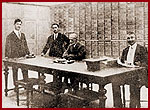|

In the interwar period the intensification of the protectionist policy pursued by the state towards domestic products was a worldwide tendency that applied in Greece as well. In December 1923 the new tariff was published and imposed higher duties to certain imported goods. Later of course, imported machinery was exempted from duties, the aim of the regulation being to encourage industry.  Specifically, the number of licences for importations of duty-free machinery increased from 144 in 1923 to 697 in 1924 and to 1621 in 1925. At the same time, between 1923 and 1926 the state facilitated the consolidation of new secondary production units through a large number of forced land expropriations. Furthermore, the right of monopoly was ceded to companies that had a capital of at least 100,000 British pounds. The tendency to expand the protectionist policy of the government did nīt have only supporters but also opponents, who thought that protectionism brought about rise in the prices of consumer goods and therefore burdened farmers and workers disproportionately. What should be noted though, is that none of the big parties of the Parliament of the interwar period developed a real industry policy, with concrete and fixed strategy. Specifically, the number of licences for importations of duty-free machinery increased from 144 in 1923 to 697 in 1924 and to 1621 in 1925. At the same time, between 1923 and 1926 the state facilitated the consolidation of new secondary production units through a large number of forced land expropriations. Furthermore, the right of monopoly was ceded to companies that had a capital of at least 100,000 British pounds. The tendency to expand the protectionist policy of the government did nīt have only supporters but also opponents, who thought that protectionism brought about rise in the prices of consumer goods and therefore burdened farmers and workers disproportionately. What should be noted though, is that none of the big parties of the Parliament of the interwar period developed a real industry policy, with concrete and fixed strategy.
The role of Banks in industrial development was hesitant. According to Margarita Dritsa: "In view of the absence of an explicit and coordinated industry policy from the state, they (the banks) did not have any proposal of their own. They followed the events and thus remained conveyors of certain structures rather than vehicles of transformation" (Biomechania kai Trapezes sten Hellada tou mesopolemou, Athens, 1990, p. 440). A typical example was the role of the major lending organisation in Greece. The National Bank was mistrustful of industry. As a result, industrialists relied on their own resources, thus suspending the activity of their enterprises, even when there were opportunities of growth. |


